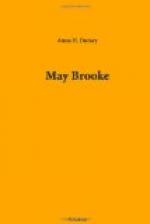CHAPTER
I.—Uncle
Stillinghast
II.—May Brooke
III.—The morning errand
IV.—Aunt Mabel
V.—Past and
present
VI.—Helen
VII.—Things of time and
eternity
VIII.—Troubled waters
IX.—Trials
X.—The warning
XI.—The midnight
Messenger
XII.—Repentance
XIII.—The new will
XIV.—The secret sin
XV.—The Discovery
XVI.—The death dream
XVII.—Remorse
XVIII.—Repentance
XIX.—Conclusion
CONSCIENCE;
Or,
The trials of may Brooke.
CHAPTER I.
Uncle Stillinghast.
“Do you think they will be here to-night, sir?”
“Don’t know, and don’t care.”
“The road is very bad,”—after a pause, “that skirts the Hazel property.”
“Well, what then; what then, little May?”
“The carriage might be overturned, sir; or, the horses might shy a little to the left, and go over the precipice into the creek.”
“Is that all?”
“Is it not dreadful to think of, sir?”
“Well, I don’t know; I should be sorry to lose the horses—”
“Oh, sir! and my cousin! Did you forget her?”
“I care nothing about her. I suppose my forefathers must have committed some crime for which I am to suffer, by being made, willy-nilly, the guardian of two silly, mawkish girls.”
“But, sir, you have been very kind to me, and it shall be the endeavor of my life to prove my gratitude.”
“Very fine, without being in the least consoling! I’d as lief have two African monkeys under my care—don’t laugh—it exasperates, and makes me feel like doing as I should do, if I had the cursed animals—”
“How is that, sir?”
“Beat you. I hate womankind. Most of all do I hate them in their transition stages. They are like sponges, and absorb every particle of evil that the devil sprinkles in the air, until they learn to be young hypocrites—triflers—false—heartless.”
“Oh, dear uncle! has such been your experience? Have you ever met with such women?”
“Have I ever met with such women, you holy innocent? I have never met with any other. Now, be still.”
“Oh! Uncle Stillinghast—”
“What!”
“I pity you, sir; indeed, I pity you. Something very dreadful must in times past have embittered you—”
“You are a fool, little May. Don’t interrupt me again at your peril.”
“No, sir.”




